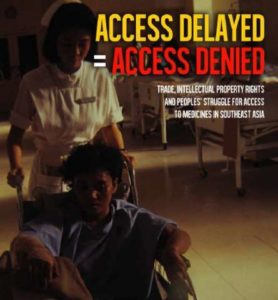25/12/2014
Under: Publications, Trade and Investment
About a third of the global population today or around 2 billion people have no access to medicines, according to the WorldHealth Organization (WHO). This figure includes a large number in Southeast Asia.[1]
Governments play a crucial role in ensuring that affordable medicines are made available especially for the poorest sectors. Unfortunately, public health systems across the region are in a state of decline due to lack of resources, political commitment and leadership.[2]
Furthermore, limited and declining budgets for health, poor delivery of infrastructure, and lack of strong public health legislation, make it difficult for governments to ensure that affordable medicines and treatment are made available for the population, especially the poorest sectors. Availability of generic medicines in the public sector has been pegged at only around 43 percent, reflecting a high level of inadequacy.
The WHO notes that such low public sector availability may force patients to purchase medicines from the private sector, where prices are generally higher and are often unaffordable.[3]
This higher private sector participation in the delivery of essential medicines becomes a concern especially in light of what the WHO describes as the private sector’s preference for branded medicines.
The WHO says: “(P)rivate sector preference for originator brand products further increases the price and makes treatment even more unaffordable. High private sector prices are caused by high manufacturer’s selling prices, taxes and tariffs, and high mark-ups in the supply chain.” [4]
Despite the high gross domestic product (GDP) growth in the region, total expenditure for health in Southeast Asia has not grown during the past decade, remaining stagnant at less than 4 percent of GDP.]
While there has been a slight increase in government’s share from 32% to 34% of total health expenditures from 2000-2010, spending on health still remains largely private in nature, with the private sector contributing from 60 to as much as 75 percent of total expenditures.
Government spending on health in Southeast Asia represents a mere 7% of total public expenditures.
In the case of the Philippines, where total health expenditures account for less than 4 percent of GDP, “Filipino households bear the heaviest burden in terms of spending for their health needs, with private out-of-pocket (OOP) expenditures reaching 56% of total health expenditures.”[5]
It is under these stark conditions that policy makers must examine the impacts of intellectual property rights (IPR) provisions under bilateral free trade agreements on peoples’ access to medicines. These so called TRIPS Plus provisions would compel developing countries to provide greater IPR protection including obligations on patents on medicines which would have serious public health implications.
Negotiations for free trade agreements launched by the European Union with Asian countries and the Transpacific Partnership Agreement (TPPA) spearheaded by the United States in particular, have pushed for restrictive patent regulations that have alarmed various sectors across the region because of the possible negative impact of these provisions on public health.
A recent report issued by the United Nations Development Program and UNAIDS on the potential impact of free trade agreements on public health gave a strong warning to leaders against trade agreements that inflate the price of medicines and deny access to lifesaving treatments for poor citizens across the globe.
The report concludes that: “To retain the benefits of TRIPS Agreement flexibilities, countries, at minimum should avoid entering into FTAs that contain TRIPS-plus obligations that can impact on pharmaceuticals price or availability. Where countries have undertaken TRIPS-plus commitments, all efforts should be made to mitigate the negative impact of these commitments on access to treatment by using to the fullest extent possible, remaining public health related flexibilities available.”[6]
Over the years, the right to health and access to medicines have become major concerns of networks monitoring various negotiations for free trade agreements across Southeast Asia.
Various multi-stakeholder platforms that include trade campaigners, health advocates and practitioners, consumer groups, and social movements have emerged across the region spearheading concerted campaigns and actions across to oppose these provisions and assert the right to public health.
As part of our network’s continuing effort to shed light and spur wider public discussions on this issue of free trade agreements (FTAs), IPR and access to medicines, we have initiated an information campaign dubbed Access Delayed, Access Denied: Peoples Struggles on Access to Medicines.
The campaign aims to document stories and images that shed light on the issue of FTAs and access to affordable medicines across the region.
This publication is also a small effort to help amplify the voices of people and groups who have taken, in many instances, a life and death struggle to promote the right to health and access to medicines.
We dedicate this book to the people on the front lines of this on-going struggle.
Joseph Purugganan, Coordinator, EU-ASEAN FTA Network
[1] Intellectual Property Rights and Access to Medicines: A Southeast Asia Perspective on Global Issues. World Health Organization. 2008
[2] Southeast Asia Public Health Initiative. Report of the First Meeting of the Strategic Advisory Group (SEARO). New Delhi, India. 2004.http://209.61.208.233/LinkFiles/Reports_HSD-279.pdf
[3] WHO Data. http://gamapserver.who.int/gho/interactive_ charts/mdg8/GHO_MDG8.html. Last accessed 12 September 2012.
[4] Briefing Document on Essential Medicines for Non-Communicable Diseases. World Health Organization.Geneva. 2011.http://www.who.int/medicines/areas/policyaccess_noncommunicable/NCDbriefingdocument.pdf
[5] From Philippine National Health Accounts as cited in the Joint Position Paper : Defend The Right To Health And Access To Affordable Medicines! No To Trips Plus Provisions In Bilateral FTAs! by the EU-ASEAN FTA Network, Medicines Transparency Alliance (MeTA) Philippines, Inc., Coalition for Health Advocacy and Transparency (CHAT), Ayos na Gamot sa Abot-Kayang Presyo (AGAP) Coalition. 2011
[6] The Potential Impact of Free Trade Agreements on Public Health.Joint United Nations Programme om HIV/AIDS (UNAIDS). 2012. http://www.unaids.org/en/media/unaids/contentassets/documents/unaidspublication/2012/JC2349_Issue_Brief_Free-Trade-Agreements_en.pdf






